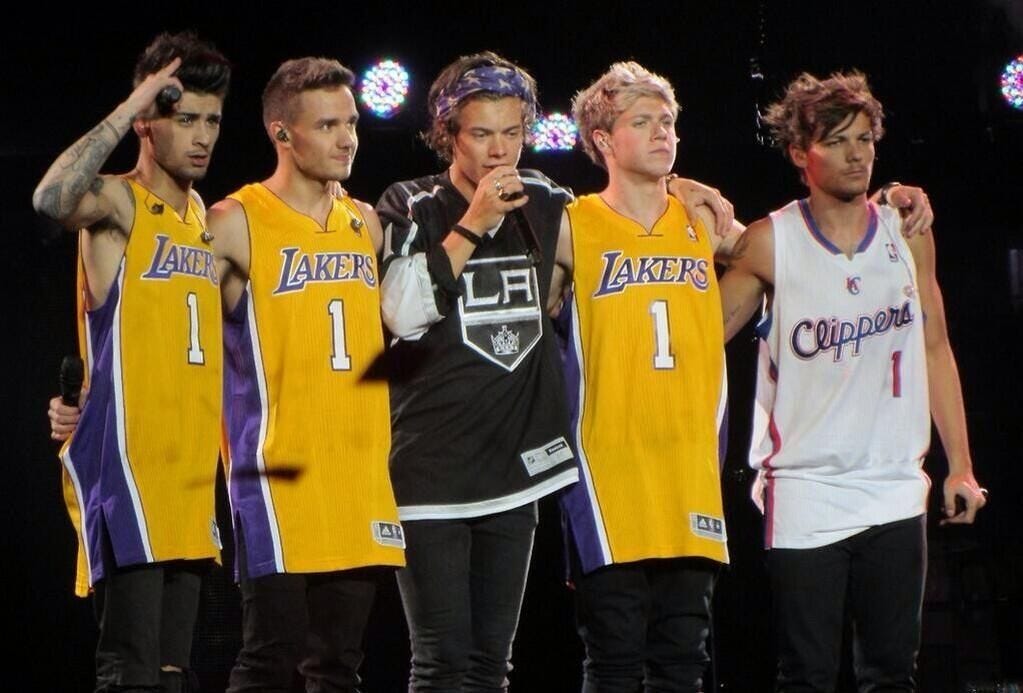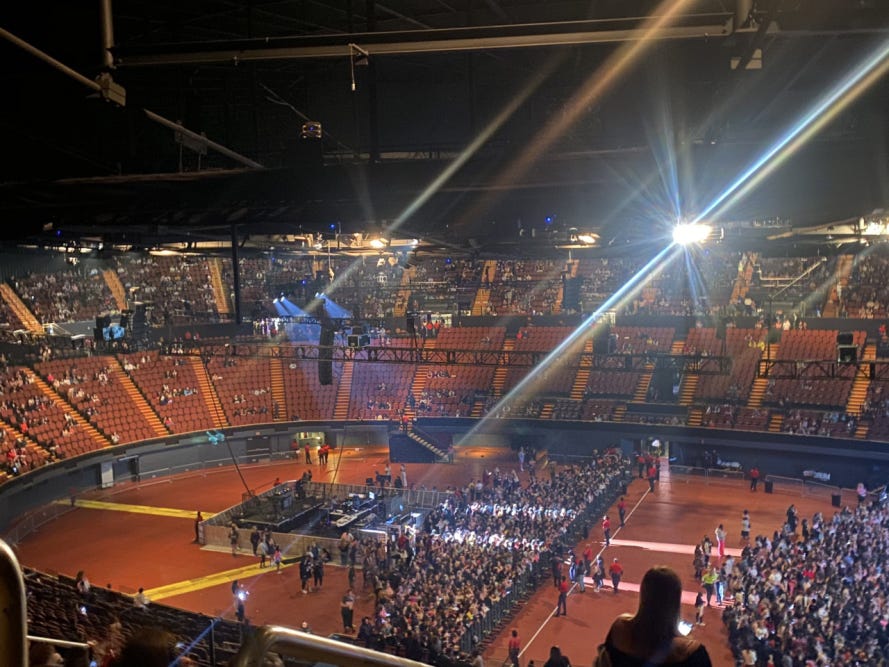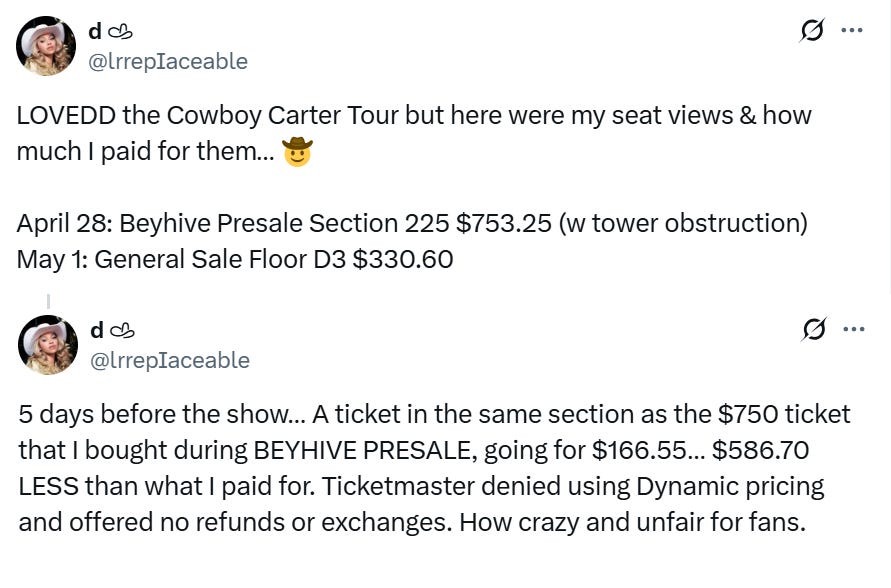Creating a Fans First Concert Industry
Can the concert/ticketing industry be disrupted in a way that benefits fans?
As I work on weaving in solutions along with the critique that I dish out, I figured it was time to share some ideas I’ve had on how the concert/ticketing industry could be disrupted.
I’ve been to seven concerts so far this year, I have tickets for five more, and I’m eyeing at least another handful. And the year isn’t even halfway over yet. I say this to make it clear that the concert industry is one that I engage with and participate in. I want the industry to thrive, I want artists to be able to make a living from going on the road, and for venues to turn a profit. And I want fans not to be wrung dry for short-term wins that hurts the goodwill of the audience and sustainability of any given artist’s career.
Pre-sale tickets should be cheaper
Let’s be frank: platinum pricing and the “100 true fans” model are about exploiting fans. This is clearest when looking at pre-sales where those who sign up are charged much, much more than those who purchase tickets during general on-sale.
The reasoning is that the price fluctuates based on demand, and the fans want it more.
This type of greed pre-dates the ubiquity of the dynamic pricing model. Case in point, in 2008, Bon Jovi received flack for fan club tickets that cost $305, with an added $75 fee. While you might see such high-junk fees on Ticketmaster today, in 2008 that would’ve been completely unheard of. Which means fans would have been better off buying tickets through Ticketmaster rather than through the fan club. Not only that, they also lied about where the seats would be located,
“The biggest insult was when members collected their tickets and found they were twenty-five and thirty rows back on the floor after they had been advertised to be in the first twenty rows.”
The shenanigans with seating remind me of BTS and Harry Styles, who both revised seating charts after tickets had been sold, which meant that fans who paid a premium for a specific seat discovered that they were no longer getting that seat. I see no point in mincing words about that: it’s fucked up. And it’s a knock on fans, specifically.
My counter-intuitive suggestion is that pre-sale tickets, fan club deals and the like should be cheaper than the general on-sale. If nothing else, this would be an incentive for more people to sign up for pre-sales and actually buy in advance. That might help with sales projections.
“Early bird” pricing is a thing for festivals, so I see no reason why they couldn’t be for concerts, too. So many times we’ve seen articles about low sales for an artist when the tickets have only recently been released: well, if they were priced appropriately, this might not be a problem.
Platinum may “yield the highest prices in the business” but what does it do to the morale of the people paying those prices? Will they return for more shows, will they remain active fans, or will the attachment that has been exploited curdle into anti-fandom sentiment and bitterness? So much of the writing on customer and fan management talks about how important it is to retain fans, yet this approach does the opposite.
Concert passes and locals first
Part of the problem when buying tickets these days is that you’re not just competing with those in your geographical area, but also fans from elsewhere that want to travel for shows. This adds to the demand and the queue and, by default, raises the cost if dynamic pricing is enabled, which it so often is.
Which means the people who the show is ostensibly put on for are at a disadvantage.
I imagine that many artists want to perform to a full house, regardless of where the audience came from, but what is the point of touring if not to serve local communities? Chrissie Hynde said as much during The Pretenders’ last UK tour when she complained about seeing the same people in the front row when she wanted to play to new people every night.1

The thing is, I’m not entirely against travelling for concerts: I’ve done it myself, multiple times. But there if the amount of out-of-town fans that are trying to attend a show make it less desirable to local audiences, you have a problem.
Which is why I think there should be different allocations for both. A locals allocation or separate release date would be great—and may actually help curb the scalping problem, since a lot of that trade isn’t tied to specific locations.
And what about the fans that want to travel and those that want to attend multiple shows? Concert passes, naturally.
I’ve seen a few acts that allow fans to select which shows they want to attend through their fan clubs or Verified Fan programs—but that still rests on the idea that the fan will attend a single show. But plenty of fans want to attend multiple shows, especially when you’re talking about superfans. There could be five, ten or even twenty and more show passes which would help demand forecasting. Fans could select which locations they want—rank them in terms of desirability, perhaps—and from there you’d have a good idea of the distribution of audience.
Live streams/streaming passes
Concert streams are something I’ve been hammering on about for quite some time, because as often as I read about money being left on the table, it’s rarely looking at what this money will be for.
Concert streams are something that could easily be monetized. Fans already watch fan cams of concerts in the thousands across various platforms. A venue with a two thousand seat capacity can have ten thousand people watching a single stream from the audience.
So why aren’t acts offering official streams? I suspect part of it is related to digital audiences being seen as replacements, but they are really expansions. Logistically, even if you’re playing a stadium show, not everyone who would like to attend can. Not everyone wants to. I avoid stadium and arena shows, but I might still watch live streams from them because they give a different vibe.
It’s bizarre to me that after the success of concert streams during lockdown it hasn’t been picked up now that touring is back on track. It wouldn’t benefit all artists, that’s true, but for the ones it would, it would be a boon to the tour gross. The hurdle is the tech and hiring someone to do the filming but—what if the venues offered this service?
The recording could even be offered as a souvenir for attendees a digital memory of the show they attended. One of my more involved ideas of fan engagement involves asking the audience for footage and photos from individual shows which can then be edited into a highlight reel or a full show depending on the quality of footage.
Merch sales
Why is pre-ordering merch not an option for shows?
In general, even if we’re not tying it to ticket sales, merch pre-orders should be a thing. No one likes to wait in a merch line, even if you have seats, and it’s certainly worse if you’ve got general admission tickets. When I wrote about set.live earlier this year, one of the options they presented that impressed me was the option to order merch from where you are in the crowd. Which means you don’t have to line up and lose your spot in the crowd, and can go pick it up later.
I’ve attended so many shows where the band say that merch profits are more important than the ticket sales. So why isn’t merch more easily accessible?
Another merch related idea relates to the customized sports jerseys that are made for artists performing at arenas and stadiums.
Camila Cabello donned the customized jersey she received for every show of Taylor Swift’s Reputation tour, which was great for local news releases, but did she hold on to all of them? Jingle Balls come with customized jerseys for the performers. One Direction would be given customized local jerseys on their tour stops over the years, which means they each have approximately 60 customized jerseys each. Are we really presuming these jerseys are being used? Or have they been put into storage, thrown out or given away?

If you’re going to be giving away jerseys that will end up in the back of someone’s closet because they’re swimming in them anyway, why not also make them available for sale?
You can marry this with the pre-order idea: allow for these customized unique jerseys to be pre-ordered when you buy your tickets. I get that bundling tickets with albums was an approach in order to chart higher, but that there has not been an attempt to allow for pre-orders of merch boggles my mind. So you’re not going to get a higher Soundscan number, but you are serving the fans and reducing the friction when it comes to buying product.
I’m also quite partial to the idea of venues being able to sell exclusive, event specific merch. Locally, there are a handful of venues that carry enough status that a piece of merch commemorating specific gigs would doubtlessly do well. Especially among the local concert heads that have favourite venues and perhaps even the tourists that want a souvenir. This would likely require a lot of negotiation since image rights, licensing, trademarks, all that good stuff is involved. But I think it’s worth looking into the feasibility, especially since so many venues are finding themselves on the brink, these days.
Waitlists and notifications
Where are the wait lists and the notifications of tickets available? So much is said about shows not selling out but how often is this due to a crowded on-sale that left people frustrated and unwilling to check for tickets at a later date?
There are very few shows that I want to see so badly that I’ll keep checking in to see if the prices have dropped or if there are new tickets released.
If there were a waitlist option, however… I would probably sign up for a lot of shows.
You could even include a price range for what the potential customer is willing to pay so that they can be notified when/if that price hits. Relying on people to constantly refresh Ticketmaster pages for more tickets to be released puts the onus on the potential customer and makes it an effort that many people won’t bother with. Why not reduce the friction?
Rush and/or Lottery Tickets
You’ll notice I haven’t said anything about resale reforms. Because I think anything I say in regard to that would simply be the equivalent of yelling at clouds. Artists have the ability to curb mark-up and resale, as Billie Eilish has done, only allowing for face-value exchanges, but most won’t because they profit off of it too. Many artists end up with “sold out” shows that are actually half empty venues because scalpers have bought up a large amount of tickets and, well, that’s still money in their pocket, isn’t it?
But if something like rush and/or lottery would be implemented, the empty seats that are such because the tickets are languishing on the secondary market could actually be sold day-of. I can imagine that even the performers who end up with tickets sold and empty seats would still rather have people in the seats, hence: rush lines and/or lottery tickets.

The lottery concept comes from the theatre, wherein a set number of tickets are set aside for a lottery before showtime. These are usually seats with obstructed views and at a steep discount, but that doesn’t mean it has to be the case for concerts.
Rush tickets is a concept that I learned of through film festivals where screenings never technically “sell out”—rather, there are no available tickets. There usually is a number of tickets that are not for sale but will not end up being used, which is what ends up sold to the so-called rush line. As per TIFF,
“If a screening is off-sale, customers without tickets may wait in the Rush line as a last chance to see the film. 15 minutes prior to a screening’s start time, Front of House staff will count the empty seats in the cinema and sell a select amount of Rush tickets to those in the Rush line on a first-come, first-served basis.”
This might be messy for a concert, but it could be handled digitally rather than having actual lines at the venue—for some venues that certainly wouldn’t be feasible at all. But it’s something that feels worth looking into, especially as scalpers have gotten more organized with discord servers and train each other on how to best score tickets. The sale would still go through, and promoters/artists would get the money. But this extra step would ensure there are actually butts in seats.
And it feels a bit better than having fans check Ticketmaster after the show started to find tickets have been made available, as many Swifties have done. I also suspect it might curb the drive for exorbitant resale tickets if there is a possibility to get tickets from official sources day-of.
These might seem like crazy out of pocket ideas, but even if they are, I hope they might trigger some thoughts on how things could be changed for the better. I’ll probably have another idea dump at some time in the future, but for now, these are the six suggestions from an avid concert-goer who loves live music.
There were multiple reports that I wasn’t able to verify that she outright got the venue to move these people’s seats at certain shows, which to me is over the line. Once you’ve bought the seat, it should be yours.








The presale fatigue is so real. There's so much hype for the presale and because concert tickets are a huge investment--and we're now competing with fans from around the globe for all shows--if we don't get a ticket during the presale or that first sale, then that's it. You take the L and move on. Meanwhile, seats sit on secondary markets unsold. It's such a shame.
*Insert the Olivia Wilde nodding gif* I'll be dreaming of the day that even just a fraction of these get implemented...What I've been sensing from the K-pop end of things is a deliberate denying of transformative changes that benefit the fans. I've written before that the industry is now manufacturing disappointment for the sake of it, because that's what keeps fans coming back. Not getting the best tickets, not getting the merch you want, not getting a specific photocard or limited edition album and so on. It is exploitative and manipulative on purpose. That frustration felt by the fans will most probably overrule the dampened morale like you rightly pointed out, and that's what drives up sales. Fans are not considered as emotional beings anymore, but only in commercial terms. It infuriates me all the time, like, how is this allowed?!